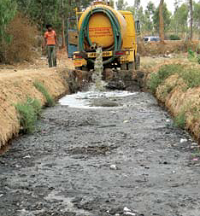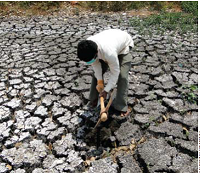Human excreta is loaded with nutrients, which when disposed off discriminately, increases pollution and leads to a loss of resources. On an average a human being produces some 500 litres of urine and 50 kilograms of faeces a year, sufficient to fertilise plants that would produce more than 200 kilograms of cereals! Scale it up and almost 40 per cent of nutrients in chemical fertilisers could be replaced by the world’s excreta.

Honey sucker trucks deposit sewage in farms for fertilisation of crops ( Image courtesy: Vishwanath Srikantaiah)
Trucks in Bangalore, deceptively named ‘ Honey suckers’, collect sewage and deposit them in farms that use this smelly, stinking cargo to sweeten their crops. In Mexico city, untreated sewage is piped to Tulla farms, to fertilise it; in Gujarat, farmers compete for the sewage at annual auctions- today farmers realise the full potential & economics of human waste.

An individual produces waste in a year sufficient to fertilise plants that produce 200 kg of cereal ( Image courtesy: newscientist.com)
A few more examples are -Israel which uses around 70 per cent of the treated effluent from its sewage treatment works for irrigation and Singapore which uses treated sewage effluent for drinking. Other benefits of this recycling include conservation of phosphate reserves & energy resources, pollution reduction and saving depleting water resources & enormous infrastructure costs.

Safer sewage: Drying faeces fully before mixing with soil helps kill pathogens ( Image courtesy: Vishwanath Srikantaiah)
The downswing of this trend is the health hazards associated with these crops. To maximise the benefits of recycling sewage onto land without creating health problems, inculcating safe practices for handling faeces and improving hygiene are vital. The best way to grab most of the advantages of nutrient and water recycling without imposing health hazards is to treat sewage before giving it to farmers.
We need to rethink and begin to recycle our faeces and urine as we recycle scarce metals, as for a developing country, the best option, both economically and ecologically, may be the sewage farm.
To read the complete article, click here
/articles/sweet-smell-success-human-waste-fertilises-land-turns-farmers-wealthy-bangalore